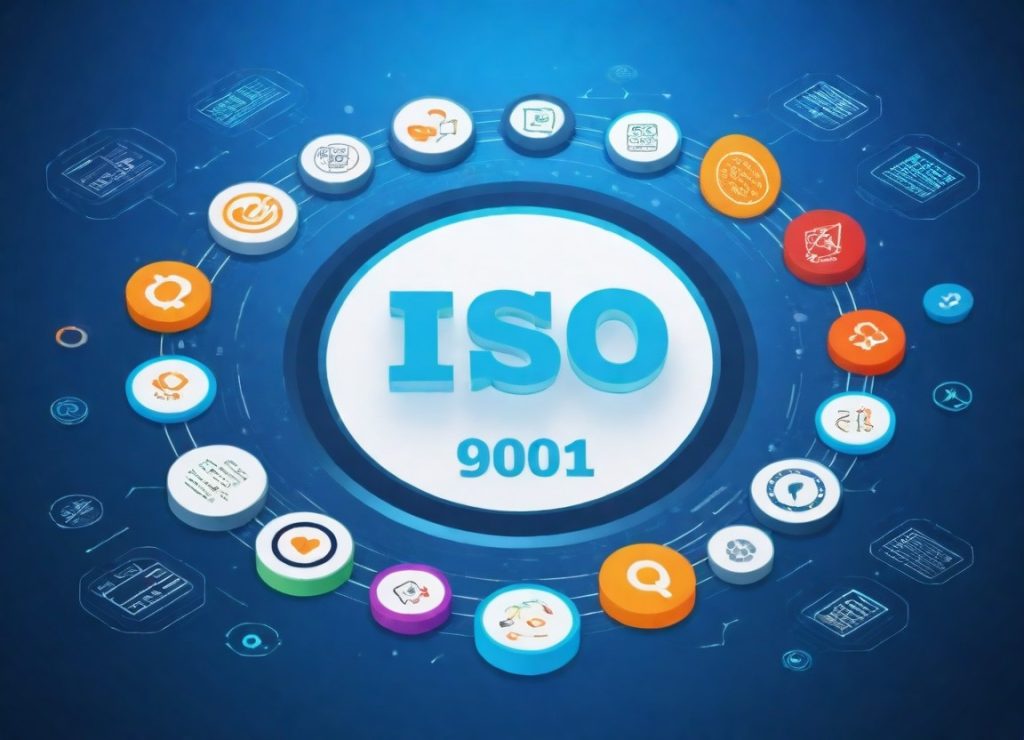
In today’s competitive business landscape, maintaining high standards of quality and efficiency is essential for success. One way that businesses can demonstrate their commitment to quality management is by obtaining ISO 9001 Certification.
Introduction to ISO 9001 Certification:
A. Explanation of ISO 9001 Certification
ISO 9001 Certification is an internationally recognized standard that sets out the criteria for a quality management system (QMS). It provides a framework for businesses to ensure that they meet the needs of their customers and stakeholders while meeting statutory and regulatory requirements related to their product or service.
B. Importance of ISO 9001 Certification for businesses
ISO 9001 Certification is crucial for businesses of all sizes and industries. It helps organizations improve their processes, reduce errors, and enhance customer satisfaction. Additionally, it demonstrates a commitment to quality and continuous improvement, which can lead to increased competitiveness and profitability.
C. Overview of what the article will cover
This article will delve into the various aspects of ISO 9001 Certification, including its significance, the certification process, benefits, misconceptions, implementation steps, case studies, and future trends.
Understanding ISO 9001 Certification:
A. What is ISO 9001?
ISO 9001 is a set of standards developed by the International Organization for Standardization (ISO) that outlines the requirements for a quality management system. It is based on principles such as customer focus, leadership, engagement of people, process approach, improvement, evidence-based decision making, and relationship management.
B. How does ISO 9001 Certification work?
To obtain ISO 9001, a business must implement a quality management system that complies with the requirements of the standard. This involves documenting processes, establishing quality objectives and policies, conducting internal audits, and undergoing an external audit by a certification body.
C. Benefits of ISO 9001 Certification
ISO 9001 Certification offers numerous benefits to businesses, including improved efficiency, better customer satisfaction, enhanced credibility, increased access to new markets, and greater consistency in product or service delivery. It also fosters a culture of continuous improvement within the organization.
The Process of Obtaining ISO 9001 Certification:
A. Preparing for certification
Before seeking certification, businesses need to assess their current processes and identify areas for improvement. This may involve training employees, updating documentation, and establishing quality objectives.
B. The certification audit process
Once the organization is ready, it can engage the services of a certification body to conduct an audit. This audit evaluates whether the organization’s QMS meets the requirements of ISO 9001. It typically involves a stage 1 audit to review documentation and a stage 2 audit to assess implementation effectiveness.
C. Post-certification activities
After successfully obtaining certification, businesses must maintain their QMS and continually improve processes. This may involve conducting regular internal audits, addressing non-conformities, and updating documentation to reflect changes in the organization.
ISO 9001 Certification and Business Growth:
A. Enhancing credibility and reputation
ISO 9001 Certification demonstrates to customers, suppliers, and other stakeholders that a business is committed to quality and professionalism. This can enhance the organization’s reputation and differentiate it from competitors.
B. Improving customer satisfaction
By implementing a QMS based on ISO 9001 standards, businesses can better understand customer needs and expectations. This leads to improved product or service quality and ultimately higher levels of customer satisfaction.
C. Facilitating access to new markets
Many industries and sectors require suppliers to be ISO 9001 certified as a prerequisite for doing business. Therefore, obtaining certification can open up new opportunities for expansion and growth in domestic and international markets.
Common Misconceptions About ISO 9001 Certification:
A. It’s only for large corporations
While ISO 9001 Certification is often associated with large corporations, businesses of all sizes can benefit from implementing a quality management system. In fact, smaller organizations may find it easier to adapt and implement the standard due to their flexibility.
B. It’s too expensive and time-consuming
While there are costs associated with implementing and maintaining an ISO 9001-certified QMS, the long-term benefits often outweigh the initial investment. Moreover, the standard is designed to be flexible and scalable, allowing organizations to tailor their implementation approach to their specific needs and resources.
C. It’s only about documentation
While documentation is an important aspect of ISO 9001 Certification, the standard is ultimately about improving processes and delivering value to customers. Organizations should focus on practical implementation rather than simply generating paperwork for the sake of compliance.
Steps to Implement ISO 9001 Certification Successfully:
A. Commitment from top management
Successful implementation of ISO 9001 Certification requires strong leadership and commitment from top management. Leaders must communicate the importance of quality management and provide resources and support for implementation efforts.
B. Engaging employees in the process
Employees at all levels of the organization play a crucial role in the success of ISO 9001 Certification. Organizations should involve employees in the development of the QMS, provide training on quality management principles, and empower them to identify and address quality issues.
C. Continuous improvement and monitoring
ISO 9001 Certification is not a one-time achievement but rather an ongoing process of continuous improvement. Organizations should establish mechanisms for monitoring and measuring performance, collecting feedback from customers and stakeholders, and identifying opportunities for improvement.
Future Trends in ISO 9001 Certification:
A. Integration with other management systems
As businesses face increasing pressure to manage multiple aspects of their operations, there is a growing trend towards integrating ISO 9001 with other management systems such as environmental management (ISO 14001) and occupational health and safety (ISO 45001). This integrated approach allows organizations to streamline their management processes and achieve synergies across different areas.
B. Emphasis on sustainability and social responsibility
In response to growing concerns about environmental sustainability and social responsibility, ISO 9001 Certification is evolving to include requirements related to sustainable practices, ethical sourcing, and corporate social responsibility. Organizations that demonstrate a commitment to these principles can enhance their reputation and appeal to socially conscious consumers.
C. Leveraging technology for easier compliance
Advances in technology, such as cloud-based QMS software and digital auditing tools, are making it easier for organizations to comply with ISO 9001 requirements. These technologies streamline processes, improve data accuracy, and facilitate remote auditing, making certification more accessible and cost-effective for businesses of all sizes.
Conclusion:
In conclusion, ISO 9001 is a valuable tool for businesses seeking to improve their quality management processes, enhance customer satisfaction, and drive growth and profitability. By understanding the importance of ISO 9001 Certification, following best practices for implementation, and staying informed about future trends, organizations can position themselves for success in an increasingly competitive marketplace.





